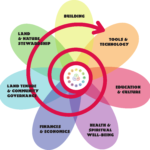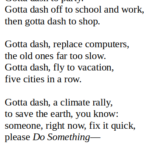What is Divestment from fossil fuels?
 Divestment is the opposite of investment: you can think of it like “uninvesting.”
Divestment is the opposite of investment: you can think of it like “uninvesting.”
To divest from fossil fuels means to sell all the oil and gas company stocks in your investment portfolio (or your university’s portfolio, or your faith community’s portfolio, or your city’s portfolio…).
Every day, the fossil fuel industry moves steadily closer to killing the planet and rendering humanity extinct. It has already begun: People are dying from climate-change-driven storms and diseases. From farmland to fisheries, people’s livelihoods are being wiped out, especially in disadvantaged nations. Glaciers are melting, faster than even the scientists had feared, and weather weirdness is being felt everywhere. A warming planet is disrupting ecosystems and wreaking havoc on wildlife. Scientists state quite clearly that unchecked global warming will mean the end of life as we know it. Yet the fossil fuel industry forges forward on its plans to drill and sell every bit of their reserves, to generate carbon emissions which will extinct us all. When you invest in fossil fuels, you are giving your support, your encouragement, and your endorsement to all of this.
A growing number of universities, cities, faith communities, nonprofits, and individuals are saying to the fossil fuel companies: “We’re outa here! We do not condone or support this.”
“The goal of divestment is … to raise awareness, stigmatize a powerful political opponent and win changes in government policy. … Its goals and effects are political and not financial.” write Carlos Davidson and Cynthia Kaufman (source). Divestment has been a powerful and effective strategy in the past, for issues like apartheid, tobacco, and human trafficing.
Peter and I have been learning a lot about divestment from fossil fuels. Ever since he began to promote a Resolution at his church’s Diocese, we’ve been researching the divestment movement, what arguments to use, etc. Last December, Peter’s Divestment Resolution passed! And now we’re researching divestment how-to’s, in order to guide the ACTION part of the process.
“Divest. Then Reinvest, but not just anywhere. … Divested capital should go to frontline communities who are building the next economy. When combined with power building, moving the money becomes a tool to truly remake economy, not just create alternatives that sit at the fringes of the extractive economy,” explains OurPowerCampaign.org
Divestment is simultaneously a public education project, a public-relations project, a political act, a money-management decision, and a manifestation-in-action of an organization’s spiritual and social commitment to the future of the earth and its people.
it is just as much about changing an organization’s messaging – internally to programs and membership, and externally to the public at large – as it is to figure out where to put its investment dollars.
In our opinion, these are some of the best resources about divestment from fossil fuels. Or read “Divestment from fossil fuels: Tips for activists“


